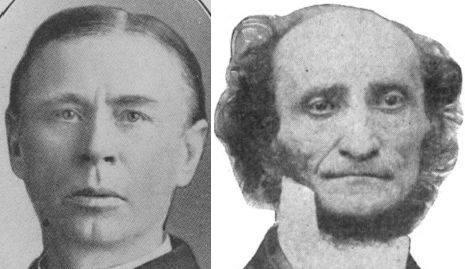This continues from
Part CM1c (Table of Contents in
Part CM1) in a series defending Walther against a false portrayal by LC-MS President Matthew Harrison on the doctrines of
Church and Ministry. — This segment moves on from Dr. Harless's testimony to the second testimony against Harrison's claim. We compare (1) Franz Pieper's reference to a writing of Walther with (2) Harrison's statements of his assertions in
Church and Office. The following table presents the two side-by-side:

| 
|
LuW, Vol. 35, July, 1889, pgs 226 [DE] McLaughlin translation | Church and Office, p. 212 |
Some have wanted to interpret the well-known words of the Smalcald Articles [Tr 24; Trigl. 510-511, 24]: “In addition to this, it is necessary to acknowledge that the keys belong not to the person of one particular man, but the (entire) Church”, as though here nothing were said of the “congregation” [“Gemeinde”], but only of the “Church” [“Kirche”], and indeed of the “entire Church”. But Walther rightly remarks: “To distinguish (here) between congregation and Church is a pure invention! [reines Fündlein]” (EN: LuW, 16: 179; DE: LuW 16, 179.) The Smalcald Articles themselves promptly define the “Church” which has all power as the local church [Ortskirche] or local congregation [Ortsgemeinde], when they go on to say” “And Christ speaks in these words, ‘Whatsoever ye shall bind’, etc., and indicates to whom He has given the keys, namely, to the Church: ‘Where two or three are gathered together in My name’, etc. “When the Smalcald Articles speak of the entire Church they intend to say, as the context indicates: not only this or that (member), but all members of the Church”. |
The congregation elects, calls, and sends. Because the Keys belong to the "whole Church," and because many of the references that follow involve individual congregations or multiple local churches calling, I do not believe one can exclude the view that multiple congregations—the whole Church [i.e. including the Synod!] — can act to call. In fact, Walther's own practice in the case of his St. Louis Gesammtgemeinde (a group of four congregations that acted as one in calling pastors) would confirm this reality. |
We notice that Pres. Harrison, because he cannot offer direct evidence of Walther's support for
his assertion, strains to then offer "Walther's own practice", essentially conceding the problematic situation he is in. Now he must essentially say that Walther did not "practice what he preached", something that would undercut his assertion that Walther
supports his theology, and that of the LC–MS. Let the reader judge! — In the next
Part CM3…

No comments:
Post a Comment
Comments only accepted when directly related to the post.